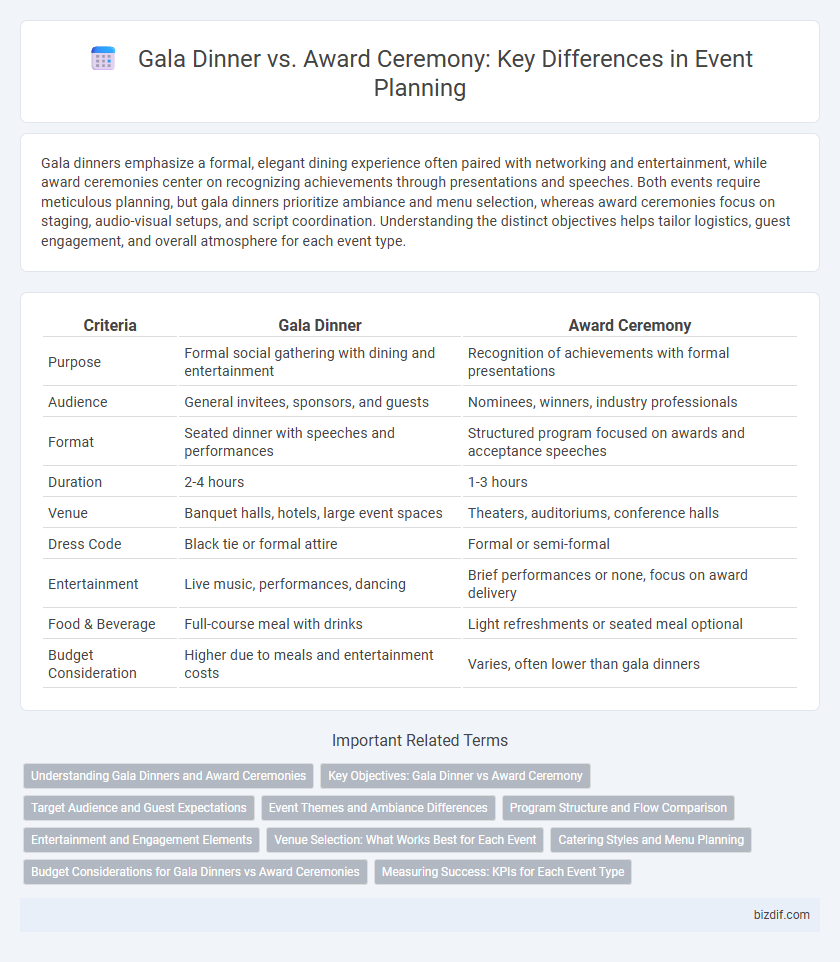Gala dinners emphasize a formal, elegant dining experience often paired with networking and entertainment, while award ceremonies center on recognizing achievements through presentations and speeches. Both events require meticulous planning, but gala dinners prioritize ambiance and menu selection, whereas award ceremonies focus on staging, audio-visual setups, and script coordination. Understanding the distinct objectives helps tailor logistics, guest engagement, and overall atmosphere for each event type.
Table of Comparison
| Criteria | Gala Dinner | Award Ceremony |
|---|---|---|
| Purpose | Formal social gathering with dining and entertainment | Recognition of achievements with formal presentations |
| Audience | General invitees, sponsors, and guests | Nominees, winners, industry professionals |
| Format | Seated dinner with speeches and performances | Structured program focused on awards and acceptance speeches |
| Duration | 2-4 hours | 1-3 hours |
| Venue | Banquet halls, hotels, large event spaces | Theaters, auditoriums, conference halls |
| Dress Code | Black tie or formal attire | Formal or semi-formal |
| Entertainment | Live music, performances, dancing | Brief performances or none, focus on award delivery |
| Food & Beverage | Full-course meal with drinks | Light refreshments or seated meal optional |
| Budget Consideration | Higher due to meals and entertainment costs | Varies, often lower than gala dinners |
Understanding Gala Dinners and Award Ceremonies
Gala dinners are elegant social events often featuring fine dining, live entertainment, and opportunities for networking, designed to celebrate achievements or raise funds. Award ceremonies specifically focus on recognizing and honoring individuals or groups for their accomplishments, typically including speeches, presentations, and trophies or plaques. Both event types emphasize formal settings but differ in purpose, with gala dinners centered on celebration and fundraising, while award ceremonies prioritize recognition and prestige.
Key Objectives: Gala Dinner vs Award Ceremony
A gala dinner primarily aims to create an elegant and memorable social experience that fosters networking, brand promotion, and fundraising opportunities. In contrast, an award ceremony focuses on recognizing achievements, boosting morale, and highlighting excellence within an organization or industry. Both events emphasize engagement but differ in their core objectives of celebration versus acknowledgment.
Target Audience and Guest Expectations
Gala dinners typically attract high-profile guests seeking an elegant social experience with gourmet dining and networking opportunities, while award ceremonies draw attendees focused on recognizing achievements, often expecting formal presentations and speeches. Target audiences for gala dinners prioritize ambiance and entertainment, whereas award ceremony guests anticipate structured programs highlighting honorees. Understanding these differences helps planners tailor event elements to meet distinct guest expectations effectively.
Event Themes and Ambiance Differences
Gala dinners typically emphasize elegance and sophistication with themes centered around luxury, such as black-tie affairs or vintage glamour, creating an intimate and upscale ambiance. Award ceremonies often incorporate dynamic, celebratory themes highlighting achievement and recognition, with vibrant lighting and stage designs that energize the audience. The ambiance of gala dinners leans toward formal and refined, while award ceremonies foster excitement and engagement through theatrical elements and multimedia presentations.
Program Structure and Flow Comparison
Gala dinners typically feature a seamless flow of socializing, dining, and entertainment with a flexible program structure that emphasizes guest interaction and ambiance. Award ceremonies prioritize a formal progression of speeches, presentations, and recognition segments to maintain a clear and purposeful narrative. Both events require precise timing and coordination, but award ceremonies demand a more rigid schedule to highlight honorees effectively.
Entertainment and Engagement Elements
Gala dinners emphasize immersive entertainment such as live music, gourmet dining experiences, and interactive performances to create a sophisticated ambiance. Award ceremonies prioritize engaging elements like dynamic stage presentations, multimedia displays, and audience participation to build excitement and highlight achievements. Both event types optimize entertainment and engagement by tailoring content that reinforces the event's purpose while maintaining guest involvement.
Venue Selection: What Works Best for Each Event
Gala dinners thrive in elegant banquet halls or luxury hotels with spacious dining areas suitable for formal seating arrangements and fine dining experiences. Award ceremonies perform best in theaters or auditoriums equipped with professional lighting, sound systems, and stage setups to highlight presentations and performances. Selecting a venue with appropriate technical capabilities and ambiance enhances guest experience and event success for each type of occasion.
Catering Styles and Menu Planning
Gala dinners typically feature formal plated service with multi-course menus emphasizing gourmet dishes and elegant presentation to create a luxurious dining experience. Award ceremonies often incorporate buffet or cocktail-style catering to facilitate mingling, offering diverse menu options that cater to quick service and varied dietary preferences. Menu planning for gala dinners centers on seasonal, high-end ingredients, while award ceremonies focus more on versatility and small, easy-to-eat portions to accommodate movement and networking.
Budget Considerations for Gala Dinners vs Award Ceremonies
Budget considerations for gala dinners typically include higher costs due to elaborate catering, luxurious decor, and entertainment, making them more expensive than award ceremonies. Award ceremonies often allocate budget primarily toward audiovisual equipment, stage setup, and trophies, allowing for more streamlined expenses. Strategic planning can optimize budget allocation by prioritizing guest experience for gala dinners and presentation elements for award ceremonies.
Measuring Success: KPIs for Each Event Type
Measuring success for a gala dinner centers on KPIs such as guest satisfaction scores, average donation or sponsorship revenue, and event attendance rate, reflecting engagement and fundraising effectiveness. For award ceremonies, key performance indicators include nominee and winner feedback, media coverage reach, and audience engagement metrics like social media interactions and live viewership numbers. Both event types benefit from tracking post-event surveys and return on investment (ROI) to evaluate overall impact and inform future planning.
Gala dinner vs Award ceremony Infographic

 bizdif.com
bizdif.com